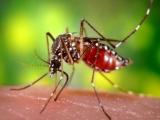In scientific developments today in the battle against Zika virus, scientists identified some existing drugs that might be useful for prevention and treatment the disease and showed that, at least in the lab, mosquitoes can pass the virus to their offspring.
Findings from the first study are preliminary but could fast-forward some drugs to the animal study stage, while the mosquito study helps fill some knowledge gaps and carries a key message that control steps shouldn't depend only on spraying.
Zika screening provides possibilities
Because a vaccine is still a few years away and Zika virus continues to spread, scientists hope there may already be drug—approved or in advanced clinical trials—that can prevent or minimize the virus's damaging effects on neural cells.
In the new study, researchers from the National Center for Advancing Translational Sciences (NCATS), part of the National Institutes of Health (NIH), modified their screening robots to look for compounds that could possibly inhibit Zika replication or reduce its capacity to kill brain cells. The screening test incorporated lab-grown "minibrains," which were developed by scientists from Johns Hopkins University and Florida State University to explore how Zika damages developing human brain cells.
The group reported its findings in Nature Medicine.
Hongjun Song, PhD, study coauthor who directs the stem cell program in the Institute of Cell Engineering at Johns Hopkins, said in a press release from the university, "It takes years, if not decades, to develop a new drug. In this sort of global health emergency we don't have that kind of time."
The team tested the drugs against three strains of Zika virus: African, Asian, and Puerto Rican. The screening method also used a type of protein that causes cell death when infected with the virus.
Screening 6,000 compounds yielded more than 100 that showed promise. The investigators then tested those on brain cells that had been infected with Zika virus to see if any offered protection. The three lead compounds they found either inhibited Zika replication or prevented the virus from killing brain cells. They candidates were emiracsan, niclosamide and a cyclin-dependent kinase (CDK) inhibitor known as PHA-690509.
Emiracsan, when combined with one of the CDK inhibitors, had both effects.
Emiracsan is in clinical trials for use in preventing liver damage from hepatitis C infection. Niclosamide is already approved in people and animals for battling parasitic infections, such as tapeworms, and PHA-690509 is an investigational compound with antiviral properties.
The researchers cautioned that that it's not clear if the effects they saw in lab culture studies would translate to humans.
Though niclosamide can vanquish parasites in the human gastrointestinal tract, the team said they don't know if the drug can penetrate the adult central nervous system or reach the fetus inside an infected mother's womb. They added that it's too soon to say if the drugs could prevent microcephaly in fetuses or complications in adults such as Guillain-Barre syndrome.
The next step is to test the drugs' activity against Zika in animals, said Guo-Ii Ming, MD, PhD, study coauthor and professor of neurology at Johns Hopkins. "So we could still be years away from finding a treatment that works."
Spraying won't reduce lingering Zika in mosquito eggs
Underscoring the importance of larvicide in curbing the mosquitoes that spread Zika virus, researchers based at the University of Texas Medical Branch at Galveston (UTMB) reported today that, in the lab setting, female Aedes aegypti mosquitoes can pass the virus on to their eggs and offspring.
They reported their findings in the American Journal of Tropical Medicine and Hygiene.
The study also provides clues on environmental persistence of the virus and what health officials are up against as they battle the virus in the months and years ahead.
To gauge Zika transmissibility to mosquito offspring, researchers experimentally infected the mosquitos in the lab and collected and incubated the eggs. They followed the hatched larvae until adulthood, then tested them to see if they were infected with Zika virus.
Cultures found Zika in one of every 250 mosquitoes tested.
Robert Tesh, MD, a study coauthor who is professor of pathology, microbiology, and immunology at UTMB, said in a press release from the journal that the ratio may sound low, "but when you consider the number of Ae. aegypti in a tropical urban community, it is likely high enough to allow some virus to persist, even when infected adult mosquitoes are killed."
"The implications for viral control are clear," he said. "It makes control harder. Spraying affects adults, but it does not usually kill the immature forms—the eggs and larvae. Spraying will reduce transmission, but it may not eliminate the virus."
The scientists said the next step is to see if vertical transmission among mosquitoes occurs in nature. Passage of the virus to mosquito offspring has been shown for other diseases such as dengue and yellow fever. They add that vertical transmission seems to provide a way for viruses to survive adverse conditions such as cold, hot, and dry weather, and even population immunity.
To assess the natural process, the investigators will need to collect Aedes larvae from water in abandoned tires and other places in areas where Zika virus is circulating.
See also:
Aug 29 Nat Med abstract
Aug 29 NIH press release
Aug 29 Johns Hopkins press release
Aug 29 Am J Trop Med Hyg abstract





















